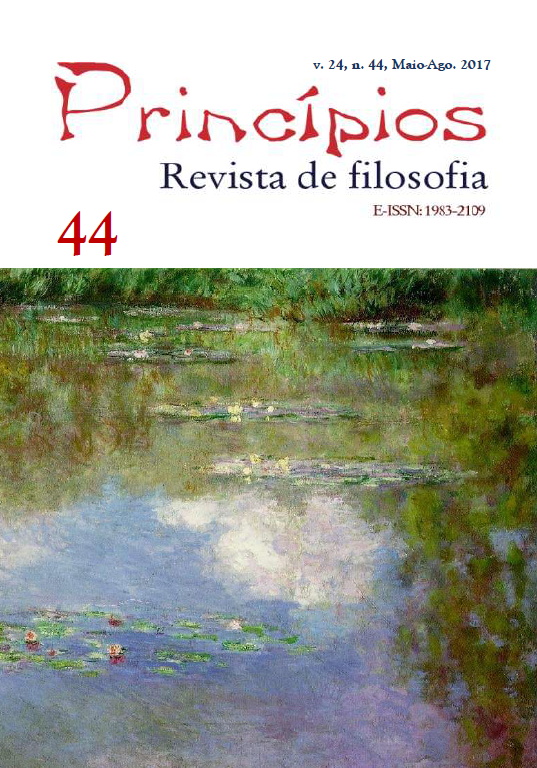Afinal de contas, o que é teoria crítica? [After all, what is critical theory?]
DOI:
https://doi.org/10.21680/1983-2109.2017v24n44ID12083Keywords:
Teoria crítica, História da filosofia contemporânea, Teoria social, Max Horkheimer, Theodor W. Adorno [Critical theory, History of Contemporary Philosophy, Social theory, Theodor W. Adorno]Abstract
O projeto da teoria crítica da sociedade tem sido definido de diferentes modos, a partir de sua gênese, de sua metodologia ou de sua história institucional. O presente artigo analisa cada uma destas possibilidades e sugere uma alternativa a elas, a saber, a de que a teoria crítica pode ser entendida como a tentativa de desdobrar um problema: o da divisão e da compartimentação do trabalho científico então em curso. Esta alternativa também permite compreender de outra forma a ruptura operada pela guinada epistêmica do final da década de 60.
[The project of the critical theory of society has been defined in different ways: through the description of its genesis, of its methodology or of its institutional history. This paper analyzes each of these possibilities and suggests an alternative to them, namely, that critical theory can be understood as the attempt to deal with a problem: that of the ongoing division and compartmentalization of scientific work. This alternative also makes it possible to understand in another way the rupture operated by the epistemic turn of the late 1960s.]
Downloads
References
ABROMEIT, John. Max Horkheimer and the foundations of the Frankfurt School. Cambridge: Cambridge University Press, 2011.
ADORNO, Theodor W. Minima Moralia. São Paulo: Ática, 1992.
ADORNO, Theodor W. Vorlesung über Negative Dialektik. Frankfurt am Main: Suhrkamp, 2003.
ADORNO, Theodor W. Dialética Negativa. Rio de Janeiro: J. Zahar, 2009.
ADORNO, Theodor W.; HORKHEIMER, Max. Dialética do Esclarecimento. Rio de Janeiro: J. Zahar, 1985.
ANDERSON, Joel. The “Third Generation” of the Frankfurt School. Intellectual History Newsletter. v. 22, 2000, p. 49-61.
ANTONIO, Robert J. Immanent critique as the core of Critical Theory. The British Journal of Sociology. v. 32, n. 3, 1981, p. 330-345.
ANTUNES, Deborah. Por um conhecimento sincero do mundo falso. Jundiaí: Paco, 2014.
BENHABIB, Seyla. Critique, norm and utopia. New York: Columbia University Press, 1986.
BOHMAN, James. Critical Theory. In: ZALTA, Edward N. (Ed.). The Stanford Encyclopedia of Philosophy (Fall 2016 Edition). Disponível em: <https://plato.stanford.edu/archives/fall2016/entries/critical-theory/>. Acesso em: 23 maio 2017.
BRESSIANI, Nathalie. Uma nova geração da teoria crítica. Discurso. São Paulo, v. 46, 2016, p. 231-250.
BUCK-MORSS, Susan. The origin of negative dialectics. New York: Macmillan, 1979.
CAUX, Luiz Phillipe de. A reconstrução normativa como método em Honneth. Peri. v. 07, n. 2, 2015, p. 83-98.
DEWS, Peter. (Ed.). Autonomy and solidarity: interviews with Jürgen Habermas. London: Verso, 1992.
DUBIEL, Helmut. Theory and Politics. Cambridge: MIT Press, 1985.
FLECK, Amaro. Da crítica imanente à crítica do sofrimento”. Ethic@. Florianópolis, v. 15, n. 1, 2016, p. 65-84.
FREYENHAGEN, Fabian. What is orthodox Critical Theory?. 2015. (manuscrito). Disponível em: <https://essex.academia.edu/FabianFreyenhagen>. Acesso em: mar. 2017.
FREYENHAGEN, Fabian. Critical theory’s philosophy. In: D’ORO, Giuseppina; OVERGAARD, Soren. (Ed.). The Cambridge companion to Philosophical Methodology. Cambridge: Cambridge University Press, 2017. p. 356-378.
JAY, Martin. A imaginação dialética. Rio de Janeiro: Contraponto, 2008.
HABERMAS, Jürgen. Teoria do agir comunicativo. São Paulo: M. Fontes, 2012. 2 v.
HABERMAS, Jürgen. Técnica e ciência como “ideologia”. São Paulo: UNESP, 2014.
HAYEK, Friedrich. Law, legislation and liberty. Vol. II: the mirage of social justice. London: Routledge, 1982.
HONNETH, Axel. Teoria Crítica. In: GIDDENS, Anthony; TURNER, Jonathan. (Org.). Teoria social hoje. São Paulo: UNESP, 1996. p. 503-552.
HORKHEIMER, Max. Notizen 1950 bis 1969 und Dämmerung. Frankfurt am Main: S. Fischer, 1974.
HORKHEIMER, Max. Teoria tradicional e teoria crítica. In: HORKHEIMER, Max et al. Textos escolhidos. São Paulo: Abril Cultural, 1975. p. 125-169. (Coleção Os Pensadores).
HORKHEIMER, Max. A presente situação da filosofia social e as tarefas de um instituto de pesquisas sociais. Praga: estudos marxistas. n. 7, 1999, p. 121-132.
KORSCH, Karl. Marxismo e filosofia. Rio de Janeiro: UFRJ, 2008.
LUKÁCS, Georg. História e consciência de classe. São Paulo: M. Fontes, 2012.
MAISO, Jordi. La subjetividad dañada: teoría crítica y psicoanálisis. Constelaciones. v. 5, 2013, p. 132-150.
NOBRE, Marcos. Teoria crítica: uma nova geração. Novos Estudos CEBRAP. v. 93, 2012, p. 23-27.
NOBRE, Marcos. Reconstrução em dois níveis: um aspecto do modelo crítico de Axel Honneth. In: MELO, Rúrion. (Org.). A teoria crítica de Axel Honneth: reconhecimento, liberdade e justiça. São Paulo: Saraiva, 2013. p. 11-54.
PINZANI, Alessandro. Teoria crítica e justiça social. Civitas. v. 12, n. 1, 2012, p. 88-106.
POSTONE, Moishe. Time, labor and social domination. Cambridge: Cambridge University Press, 2003.
REPA, Luíz Sérgio. Reconstrução e crítica imanente: Rahel Jaeggi e a recusa do método reconstrutivo na Teoria Crítica. Cadernos de Filosofia Alemã. São Paulo, v. 21, n. 1, 2016, 13-27.
SCHMIDT, Alfred. L’oeuvre de jeunesse de Horkheimer et la naissance de la théorie critique. Archives de Philosophie. v. 49, n. 2. 1986, p. 179-204.
SIM, Stuart. Entendendo a teoria crítica. Lisboa: Leya, 2013.
STAHL, Titus. Habermas and the project of immanent critique. Constellations. v. 20, n. 3, 2013, p. 533-552.
ZAMORA, José Antonio. El enigma de la docilidad: teoría de la sociedad y psicoanálisis. In: CABOT, M. (Ed.). El pensamiento de Th. W. Adorno: balance y perspectivas. Palma de Mallorca: Universitat de les Illes Balears, 2007. p. 27-42.
Downloads
Published
How to Cite
Issue
Section
License
Authors retain copyright and grant the journal right of first publication with the work simultaneously licensed under a Creative Commons Attribution License that allows others to share the work with an acknowledgement of the work's authorship and initial publication in this journal.


 Português (Brasil)
Português (Brasil) English
English Español (España)
Español (España) Français (Canada)
Français (Canada)


